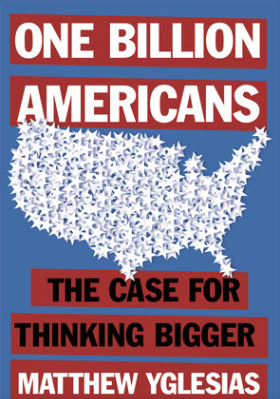 Author: Matthew Iglesias
Author: Matthew Iglesias
Publisher: Portfolio
Publication Date: 2020
Book review by Greg Turner, APF
Richard Feynman pointed out that the basic laws of physics are simple; what creates complexity is the sheer number of possibilities generated by interactions among quantum particles. Stuart Kauffmann, theoretical biologist at the Santa Fe Institute, highlighted how increasing numbers of basic conditions create exponential growth in connections among them, resulting in “autocatalytic” self-organization. Another Santa Fe Institute scientist, Geoffrey West, describes scaling laws by which increasing social interactions generate benefits that outstrip the seeming capacity of populations to otherwise achieve them. Following this progression but veering into the socio-political realm, Yglesias states the case for the U.S. to get big in the future—really big—if we want to remain competitive in the world. The alternative, he says, is a declining standard of living and diminished freedoms.
While the figure of a billion seems arbitrary, the author claims that we must reach this number because only with volume can we ensure a sufficient quantity of ideas, innovation, and wealth to support a continuation of our global stature. The sheer volume of possibilities, the autocatalytic potential, and the benefits from scaling that the scientists extoll are required. For example, China and India will soon surpass us in economic might should they achieve even modest growth in income and wealth, solely due to the mathematics of their scale. Although Yglesias may not have referenced Feynman, Kauffman, or West, he is making their argument. The output of social interactions will multiply simply on account of the volume of inputs. This basic diagnosis is on target.
His solution is free education, expanded welfare benefits, and other measures to provide the economic security that middle class families need in order to have more children, which he maintains they want. Internal population growth and selective immigration will then get us to the billion. You might argue with elements of his prescription.
An interesting aspect is his exploration of population density. Comparing the U.S. with other nations in the world, he says that we have plenty of room here for many more people. According to United Nations data, India had 1,077 persons per square mile in 2019, and China 387. The United States had 87. We are still a nation with empty spaces.
Yglesias sees a future of greater density in cities, especially the ones in presently depopulating areas in the Rust Belt and the Great Plains. But available population data shows that densities in Western nations increased during the initial stages of industrialization, then slowed and reversed. Furthermore, data from the Lincoln Institute of Land Policy indicates that urban densities have declined globally since 1920, at the same time that urban populations have grown overall. In other words, while the imprint of cities on the earth’s surface widens, it also lightens. Some powerful trends would need to reverse for Yglesias’ assessment in this regard to come true.
But I am nitpicking. Whatever analytical weakness one might see in this book is overshadowed by the basic premise, which has merit. Go big or go home, as they say. Yglesias makes a formidable case for the former.
According to Wikipedia, Matthew Yglesias is an American blogger and journalist who writes about economics and politics. Yglesias has written columns and articles for publications such as The American Prospect, The Atlantic, and Slate. He is a co-founder of Vox.




